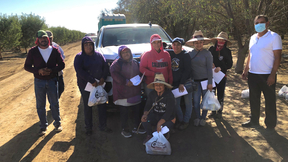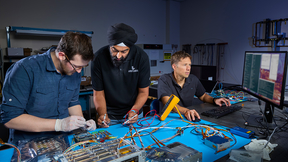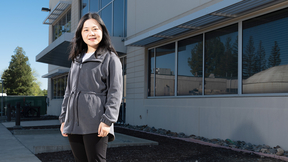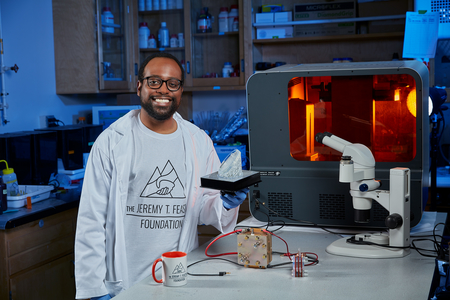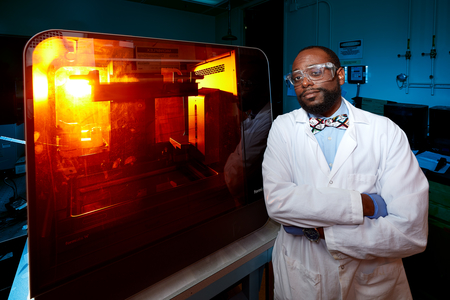LLNL’s Feaster named to American Institute for Chemical Engineering’s '35 Under 35' class for 2023
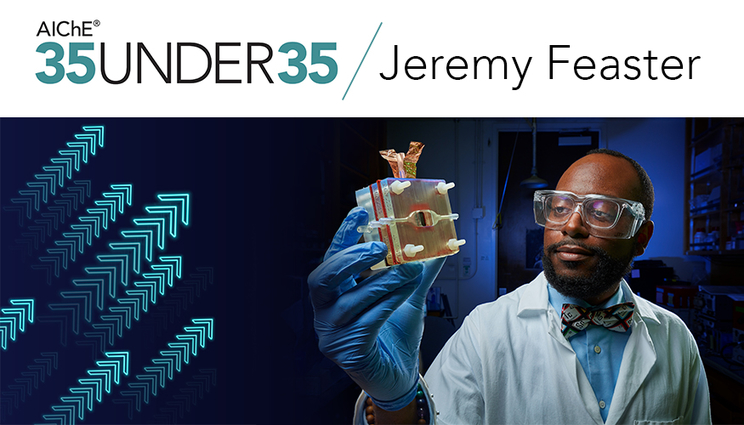 (Download Image)
(Download Image)
The American Institute for Chemical Engineering recently announced Lawrence Livermore National Laboratory staff scientist Jeremy Feaster as one of its “35 Under 35” award winners for 2023, honoring Feaster for his outstanding contributions to the field and the chemical engineering community. Graphic by Amanda Levasseur.
Lawrence Livermore National Laboratory staff scientist Jeremy Feaster has been named as one of the American Institute for Chemical Engineering’s (AIChE) “35 Under 35” award winners for 2023. The recognition honors chemical engineers under the age of 35 who have made outstanding contributions to their field and to the chemical engineering community, according to the organization.
The 35 scientists AIChE chose “embody what it is to be an accomplished chemical engineer” and “will pave the way for future generations, serving as role models and innovators,” according to the organization. Feaster, a principal investigator and scientist in LLNL’s Materials Science Division, said the award reminded him of his first exposure to chemistry, when he was in 10th grade.
Feaster’s high school chemistry teacher, Magdalene McClain, introduced him to the fundamentals of chemical reactions and challenging him to ask questions — not just about how something worked, but how chemistry could be used to help humanity. McClain inspired Feaster to get a summer job in the chemistry department at University of North Carolina at Charlotte, where he washed glassware for the graduate students and experienced the world of research for the first time. Feaster would build off the experience and commit to blending chemistry with service through tutoring, teaching and providing scholarships and mentoring opportunities for Black and underrepresented students.
“This award means a lot to me and to my family, friends and community,” Feaster said. “From the beginning, I’ve wanted to use chemistry to help communities and solve problems. Seeing how chemical engineering can be used to serve people inspired me to pursue it as a degree and a career, and my heart for using chemistry and service to help communities has only grown. I hope that through this award, I can continue to inspire more students – especially from underserved communities – to want to learn more about chemistry and chemical engineering, not just for the science, but for building a sustainable and compassionate society.”
Feaster’s research at LLNL focuses on designing and creating 3D-printed electrochemical reactors that convert air into fertilizer and carbon dioxide into valuable products such as plastics or fuels, to help address climate change and sustainability concerns. He also serves as co-chair for LLNL’s African American Body of Laboratory Employees.
In 2012, Feaster founded the Jeremy T. Feaster Foundation while he was still a student at the Georgia Institute of Technology (Georgia Tech) to aid Black and underrepresented students in pursuing higher education and careers in STEM. To date, the 501(c)(3) nonprofit has awarded more than $25,000 in scholarships to 14 students around the country who embody the foundation’s “lift as you climb” philosophy, while mentoring hundreds more and sparking creation of five new nonprofits. The organization also developed curricula to help students start their own nonprofits and teach them the value of “servant leadership” through community service.
Feaster earned his master’s degree and Ph.D. in chemical engineering from Stanford University after completing his bachelor’s degree in chemical and biomolecular engineering at Georgia Tech. In his free time, Feaster enjoys winemaking, cooking and practicing mixed martial arts.
Contact
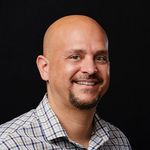 Jeremy Thomas
Jeremy Thomas
[email protected]
(925) 422-5539
Related Links
35-under-35 AwardAmerican Institute for Chemical Engineering’s
Materials Science Division
African American Body of Laboratory Employees
Jeremy T. Feaster Foundation
Jeremy Feaster Spotlight Article
Tags
Advanced Materials and ManufacturingCareers
Physical and Life Sciences
Materials Science
People
Science
Featured Articles
